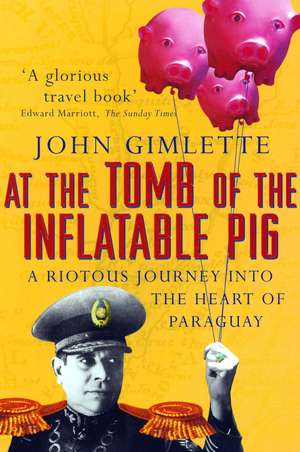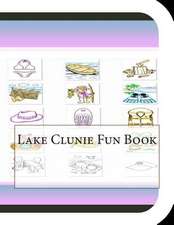At the Tomb of the Inflatable Pig
Autor John Gimletteen Limba Engleză Paperback – 5 feb 2004
| Toate formatele și edițiile | Preț | Express |
|---|---|---|
| Paperback (2) | 100.98 lei 3-5 săpt. | +12.10 lei 7-13 zile |
| CORNERSTONE – 5 feb 2004 | 100.98 lei 3-5 săpt. | +12.10 lei 7-13 zile |
| Vintage Publishing – 31 dec 2004 | 117.69 lei 3-5 săpt. |
Preț: 100.98 lei
Nou
Puncte Express: 151
Preț estimativ în valută:
19.32€ • 20.17$ • 15.99£
19.32€ • 20.17$ • 15.99£
Carte disponibilă
Livrare economică 14-28 martie
Livrare express 28 februarie-06 martie pentru 22.09 lei
Preluare comenzi: 021 569.72.76
Specificații
ISBN-13: 9780099416555
ISBN-10: 0099416557
Pagini: 400
Ilustrații: 16
Dimensiuni: 129 x 198 x 27 mm
Greutate: 0.29 kg
Editura: CORNERSTONE
Locul publicării:United Kingdom
ISBN-10: 0099416557
Pagini: 400
Ilustrații: 16
Dimensiuni: 129 x 198 x 27 mm
Greutate: 0.29 kg
Editura: CORNERSTONE
Locul publicării:United Kingdom
Notă biografică
John Gimlette is a regular contributor of travel articles and photographs to Condé Nast Traveller, as well as numerous journals and newspapers in England. He is a practicing attorney in London, where he lives with his family. This is his first book.
Extras
Chapter 1
My hostess was studying me with renewed interest.
"Did you say," she said slowly, "that he cut the child's hands off with a blowtorch?"
"Well, yes." I fidgeted. "Doesn't anyone remember?"
Down the table everyone shook their head, except the thief.
"I remember it," he said.
Attention swivelled in his direction. The thief was pouring more wine into his Coca-Cola. It was rumoured he'd skinned his own bank and almost got away with it. Overnight, they said, his eyes had turned black like a panda's, and his Dalmatians had run away.
"Didn't they make a film," he piped, "about The Blowtorch Case? With Antoni Opkins and those moths. That was here, wasn't it, Mónica? That was Paraguay?"
There was dissension from the silverware and glass.
The hostess was examining me again. "When did you hear these things, John?"
"When I first came here. About twenty years ago."
Ah, they all said, twenty years ago. Things were different then.
2
Throughout the summer of 1982, Asunción had been gripped by a good murder.
The body of the boy, fourteen years old and horribly mutilated by the blowtorch, had been discovered in a wealthy suburb. The details of the story were happily never very clear and the press had shown a maddening indifference to the whole affair, doubtless on the General's instructions. Perhaps his German priggishness had got the better of him or, more likely, he didn't want his Paraguayans to speculate on the possibility that his police did not have eyes and ears in every home. Starved of details by their caudillo, the citizens drank up the trickle of gossip that collected downtown, and suffocated by heat, they made themselves giddy with fantastical tales, each more grotesque than the last.
"They say he's someone in the government-a sadist," I was told by a friend, Reynaldo Gosling. Reynaldo was a few years older than me and was already a student, but he seemed to enjoy our meetings at the William Shakespeare, feasting on my most mawkish tales from England. One grandfather, he explained, had been a British railway engineer and the other had distinguished himself in the Chaco War of the thirties. Although he'd never been outside Paraguay he affected a familiarity with England and nurtured a fondness for El Pub Inglés. "Apparently, he tortured the boy for hours with a blowtorch before strangling him."
"Yes," agreed his pretty Guaraní girlfriend. "And he smashed the boy's face in too. They must have been lovers."
"That's shit," said another man, who'd been munching cornmeal chipa at the bar. "He's a Nazi. One of the General's Germans. I heard he did medical experiments in those Jewish camps. Someone's covering for him."
This was dangerous talk and Reynaldo steered us back towards safer ground and the more conventional wisdom. "Look, he's probably just some homosexual."
The police were at their wits' end, and truckloads of constables, old Mauser rifles wedged between their knees, ploughed up and down Independencia. They didn't expect to find the blowtorch killer but they could at least stifle the rumours of their own ineptitude. In a further act of desperation, they took a sniff at the gossip and rounded up all of Asunción's homosexuals. Not knowing what to do with such a large number of patently harmless individuals, they locked them up for a few days and then released them. The citizens were unappeased.
But it wasn't immediately obvious how the rumours thrived or even spread about the city. By day the centre of town was silent and deserted. Baked by the sun, the cobbles shimmered in a heat haze. The windows of the Guaraní-baroque mansions were tightly shuttered against the fierce white light, their vast panelled doors secured shut with bolts the size of ox-bones. Those who had the money had fled the heat by passing the summer on the beaches of Uruguay. A snake of BMWs slithered in and out every season.
It seemed that at these times of day only the beggars stirred in the centre of the city, and they didn't gather to gossip. "Most of them are survivors of the Chaco War," Reynaldo told me. "They got shot up in our war with Bolivia. Then they got amputations and now they hang around on the Plaza de Los Héroes. Actually, they're a nuisance."
They probably wouldn't be for much longer. With limbs so smashed by explosions and minds so raked by gunfire and whisky-tipo, it wouldn't be long now before old age mercifully carried them off-if the giant Mercedes buses that crashed over the ruts didn't get them first. Each time I passed them, I wondered if they ever thought of themselves as the lucky ones, the ones that survived a war so terrible that nearly a third of Paraguay's fighters perished.
There was a brief moment at the end of each day, that exquisite moment of dusk that tropical countries earn themselves, when the sun plunged into the Río Paraguay and the city was suffused with pink light, when the citizens, those that remained, would emerge from their shuttered houses, blinking and shaking sleep out of their clothes. Some would stare blankly into the shop windows at the electrical goods smuggled in from Panama and the bottles of whisky piled up like ammunition. Others took their seats under the lapacho trees, in the Plaza Uruguaya, kicked off their shoes and waited for the officious, unofficial curfew to begin. Perhaps they gossiped, exchanging the latest gothic details on the blowtorch murder, but most just sat, waiting silently for the end of the day.
As the light changed from pink to purple, Asunción's only neon sign, large bright red letters on the pediment of the National Bank, flickered into life: PEACE, WORK AND WELL-BEING WITH STROESSNER. When they saw this, people put their shoes and socks back on and went home.
For some reason the writ of the curfew never extended to The Lido bar. As long as you could get yourself there and back, weaving around the patrols, it seemed as though you could sit there as long as you liked, sluicing away the dust and diesel with icy pilsen called Antarctica. It ought to have been the perfect place for the traffic in good stories. It stood right at the centre of town and had even been described rather whimsically as lying "at the crossroads of South America." Inside, a great amphitheatre of tangerine-coloured bar swooped out into a brilliant white room. It was a room full of air that swirled in through the windows, was whipped by giant ceiling fans and then hustled out on to the street again. It was pure 1950s; you pulled upholstered stools up to the bar and gave your orders to the little duck-hipped ladies in tangerine aprons and tangerine hats who waddled around in the arena.
Paraguayans enjoyed it, but their enjoyment was reverential and mute. They sat huddled around the counter, inward-looking, facing each other across the gorgeous orange arena; there were the middle-class Hispanics with their brilliantined hair, pig-skin briefcases and buckled alligator shoes; there were mestizos and touts, Maká Indians selling bows and arrows and mercantes hawking lace as thin and light as cobwebs; there were ruddy, blond immigrants from Latvia, Ukraine and the Balkans spooning up bori-bori soup with big, farmers' hands; there were the German settlers pawing over Neues für Alle, while their wives, hair-dyed and lacquer-faced, sipped tereré, an icy privet-leaf tea; then there were Koreans, newcomers to the scene, who'd set themselves up around the mercado and who only occasionally came down to town for acupuncture or lumbago treatment and who stuck to the cold beer. They all ate and sipped and spooned and sucked in silence, while the orange ladies heaved great trays of parillada steak and juicy hummocks of steaming maize cake out of the kitchens. The diners stared through them, at each other, wondering, I fancied, who was the police informer, who was the whisky smuggler, who was the Nazi and who could do that to a boy so young.
When the silence of the Paraguayans became too much, I would duck across the Plaza and up Calle Chile to the Shakespeare. Although it called itself a pub, it was really just a room above a Korean pharmacy, reached by some musty stairs. It wasn't even particularly English, although it was staffed by two Glaswegians who thought that life in such a place was "better than life on the dole." The young Paraguayans thought it was Paradise, even though there was nothing to drink but Antarctica and the temperature seldom fell below gas mark 3. They liked to hear Rod Stewart roaring out of the tape recorder and they were thrilled to be in a place that could rumble with laughter. Above all they loved the way that you had to shout very loud-in English-to be heard. It allowed them to transport themselves in their imaginations away from the stifling conformity and oppression of Asunción to England, a place hardly any of them had seen, where people had endless fun and sex and danced all night around their palm trees. The illusion was sustained for as long as it took before someone tripped over the plug to the tape deck, throttled Rod Stewart and plunged us all back into silence. During the lull, I was spotted by a girl with a fantastic rick of black hair piled up around her head.
"Are you English, kid?"
"Yes," I admitted. I was terrified; girls at my school hadn't behaved like this. She was sucking the icebergs out of her Antarctica and crunching them up with her teeth. "Are you?"
"Course I'm fucking not. This is Paraguay. I'm fucking Paraguayan." She took a step back and cocked her head, awaiting my reaction. I failed to say anything.
"OK. Look. My father was Japanese and my mother half-Spanish and half fucking English. That makes me fucking Paraguayan."
"You speak good English," I tried.
She'd worked in Liverpool for a while. Now she imported Scotch whisky into Paraguay.
"But only the best. The fucking most expensive. Anyway, what are you doing here?"
I hesitated. "I've come to see President Stroessner."
"Well, he's a fuck-head!" she exploded, and threw her magnificent head back and laughed. "A total fuck-head! You know what he does? He takes people he doesn't like up in planes and flies over the Chaco Desert. And then what? He fucking well throws them out!"
I opened my mouth to protest, but at that moment the music restarted. She pressed her ear up close to my face, which disappeared into an impenetrable thicket of curls and ringlets. Everything went dark and my nose tickled.
"You can't say that here," I muffled. "The pyragüés . . ."
The pyragüés was the name everybody used for the secret police. It was a Guaraní word which meant-literally-"the hairy-footed ones." It was a cute reminder that their raids were sudden, silent and invariably savage.
"The pyragüés don't speak English, you fuck-head. All the police are fuck-heads!" She punched me on the chest and turned and wandered off towards the bar, with her beer bottle raised in salute. "The police are fuck-heads!" The crowd around the bar parted and shrank away.
Reynaldo appeared by my side. "Do you really want to see President Stroessner then?"
"Er, yes." I hadn't considered it before.
"He holds an audience every Tuesday in the Government Palace. That's tomorrow."
*
I zig-zagged back to my pensión, the Hispania, on the other side of Los Héroes. It was grizzled baroque and much favoured by Mennonites, the Germanic Anabaptists whose colonies were dotted round the country.
These strange, pale people were the distant fallout of a diaspora that had begun in Switzerland in 1525 when the "left wing of the Reformation" split with Ulrich Zwingli. Self-contained and self-denying, the Mennonites had been jostled around the world ever since, splitting themselves into smaller and smaller fragments. The splinter group that used the Hispania were known as "The Mexicans," for no better reason than that a part of their wanderings had been spent-in conditions of exorbitant misery-in central America. They now padded in and out
of Asunción looking for seeds and farm implements.
"We are," said their literature, "die stillen in lande-the unobtrusive ones." This was only partly true. Certainly, the Mexicans confined themselves to the top floor of the hotel and it was rumoured that they even denied themselves a breeze from the fans lest their elders should hear of such vanity and cast them out from their number. But whenever they went out, they wore strange nineteenth-century costumes of bonnets and black calico. Even in a city of oddities like Asunción, this was hardly unobtrusive.
I had a room on the second floor. It was a vast, mildewed space that might once have been used for dancing classes. It had floor-to-ceiling louvred shutters that were so seized up with drifts of green paint that they'd become petrified in the open position, admitting scalding blasts of dust and roasted corn from the street below. I shared this great green tropical ballroom with two others, for whom it was, in its own way, heavenly. The first was an Englishman called Kevin Pluck who'd come to South America to give some long and careful thought to the question of whether or not he should ever get a job. He had an opening in the car factory at Luton, but the delicious, orange-blossomed lassitude that overwhelmed Asunción ensured that he wasn't going to hurry the decision. He'd at least made up his mind to return to Luton with a suntan and so he spent a lot of time and effort trying to go brown. For some reason his skin remained determinedly cheesy.
The other man was a New Zealander called Eddy Taylor. From the start he declared our room to be a "real beaut," and he dragged us all out to celebrate our good fortune. Eddy was chronically, pathologically happy and I have often wondered since then whether I wasn't somehow infected with his enthusiasm and afflicted with a lifelong and slightly illogical appetite for Asunción. Eddy was unstoppable. He'd been a cow-puncher, a horse-breaker, a sheep-dagger, a dishwasher and a disc jockey. There was no end to the revolting things that he was prepared to find satisfying. He was spattered with freckles and ginger whiskers, and little bits of him-teeth mainly-had been knocked out in fights. He was everything that Kevin wasn't and that Kevin was glad he wasn't.
Although all that we had in common was the fact that we all slept in the same mouldering baroque cavern, we became good friends. We often ate together at the railway station, where-among the belch and hiss of steam engines-the food was the cheapest in the city. Some afternoons, Eddy led us out on illegal bathing parties to the Hotel Guaraní, a hideous concrete pillar built by the General to cope with the tidal wave of tourists that was about to overwhelm Asunción. The hotel was even featured on the bank-notes to guide the tourists home.
From the Hardcover edition.
My hostess was studying me with renewed interest.
"Did you say," she said slowly, "that he cut the child's hands off with a blowtorch?"
"Well, yes." I fidgeted. "Doesn't anyone remember?"
Down the table everyone shook their head, except the thief.
"I remember it," he said.
Attention swivelled in his direction. The thief was pouring more wine into his Coca-Cola. It was rumoured he'd skinned his own bank and almost got away with it. Overnight, they said, his eyes had turned black like a panda's, and his Dalmatians had run away.
"Didn't they make a film," he piped, "about The Blowtorch Case? With Antoni Opkins and those moths. That was here, wasn't it, Mónica? That was Paraguay?"
There was dissension from the silverware and glass.
The hostess was examining me again. "When did you hear these things, John?"
"When I first came here. About twenty years ago."
Ah, they all said, twenty years ago. Things were different then.
2
Throughout the summer of 1982, Asunción had been gripped by a good murder.
The body of the boy, fourteen years old and horribly mutilated by the blowtorch, had been discovered in a wealthy suburb. The details of the story were happily never very clear and the press had shown a maddening indifference to the whole affair, doubtless on the General's instructions. Perhaps his German priggishness had got the better of him or, more likely, he didn't want his Paraguayans to speculate on the possibility that his police did not have eyes and ears in every home. Starved of details by their caudillo, the citizens drank up the trickle of gossip that collected downtown, and suffocated by heat, they made themselves giddy with fantastical tales, each more grotesque than the last.
"They say he's someone in the government-a sadist," I was told by a friend, Reynaldo Gosling. Reynaldo was a few years older than me and was already a student, but he seemed to enjoy our meetings at the William Shakespeare, feasting on my most mawkish tales from England. One grandfather, he explained, had been a British railway engineer and the other had distinguished himself in the Chaco War of the thirties. Although he'd never been outside Paraguay he affected a familiarity with England and nurtured a fondness for El Pub Inglés. "Apparently, he tortured the boy for hours with a blowtorch before strangling him."
"Yes," agreed his pretty Guaraní girlfriend. "And he smashed the boy's face in too. They must have been lovers."
"That's shit," said another man, who'd been munching cornmeal chipa at the bar. "He's a Nazi. One of the General's Germans. I heard he did medical experiments in those Jewish camps. Someone's covering for him."
This was dangerous talk and Reynaldo steered us back towards safer ground and the more conventional wisdom. "Look, he's probably just some homosexual."
The police were at their wits' end, and truckloads of constables, old Mauser rifles wedged between their knees, ploughed up and down Independencia. They didn't expect to find the blowtorch killer but they could at least stifle the rumours of their own ineptitude. In a further act of desperation, they took a sniff at the gossip and rounded up all of Asunción's homosexuals. Not knowing what to do with such a large number of patently harmless individuals, they locked them up for a few days and then released them. The citizens were unappeased.
But it wasn't immediately obvious how the rumours thrived or even spread about the city. By day the centre of town was silent and deserted. Baked by the sun, the cobbles shimmered in a heat haze. The windows of the Guaraní-baroque mansions were tightly shuttered against the fierce white light, their vast panelled doors secured shut with bolts the size of ox-bones. Those who had the money had fled the heat by passing the summer on the beaches of Uruguay. A snake of BMWs slithered in and out every season.
It seemed that at these times of day only the beggars stirred in the centre of the city, and they didn't gather to gossip. "Most of them are survivors of the Chaco War," Reynaldo told me. "They got shot up in our war with Bolivia. Then they got amputations and now they hang around on the Plaza de Los Héroes. Actually, they're a nuisance."
They probably wouldn't be for much longer. With limbs so smashed by explosions and minds so raked by gunfire and whisky-tipo, it wouldn't be long now before old age mercifully carried them off-if the giant Mercedes buses that crashed over the ruts didn't get them first. Each time I passed them, I wondered if they ever thought of themselves as the lucky ones, the ones that survived a war so terrible that nearly a third of Paraguay's fighters perished.
There was a brief moment at the end of each day, that exquisite moment of dusk that tropical countries earn themselves, when the sun plunged into the Río Paraguay and the city was suffused with pink light, when the citizens, those that remained, would emerge from their shuttered houses, blinking and shaking sleep out of their clothes. Some would stare blankly into the shop windows at the electrical goods smuggled in from Panama and the bottles of whisky piled up like ammunition. Others took their seats under the lapacho trees, in the Plaza Uruguaya, kicked off their shoes and waited for the officious, unofficial curfew to begin. Perhaps they gossiped, exchanging the latest gothic details on the blowtorch murder, but most just sat, waiting silently for the end of the day.
As the light changed from pink to purple, Asunción's only neon sign, large bright red letters on the pediment of the National Bank, flickered into life: PEACE, WORK AND WELL-BEING WITH STROESSNER. When they saw this, people put their shoes and socks back on and went home.
For some reason the writ of the curfew never extended to The Lido bar. As long as you could get yourself there and back, weaving around the patrols, it seemed as though you could sit there as long as you liked, sluicing away the dust and diesel with icy pilsen called Antarctica. It ought to have been the perfect place for the traffic in good stories. It stood right at the centre of town and had even been described rather whimsically as lying "at the crossroads of South America." Inside, a great amphitheatre of tangerine-coloured bar swooped out into a brilliant white room. It was a room full of air that swirled in through the windows, was whipped by giant ceiling fans and then hustled out on to the street again. It was pure 1950s; you pulled upholstered stools up to the bar and gave your orders to the little duck-hipped ladies in tangerine aprons and tangerine hats who waddled around in the arena.
Paraguayans enjoyed it, but their enjoyment was reverential and mute. They sat huddled around the counter, inward-looking, facing each other across the gorgeous orange arena; there were the middle-class Hispanics with their brilliantined hair, pig-skin briefcases and buckled alligator shoes; there were mestizos and touts, Maká Indians selling bows and arrows and mercantes hawking lace as thin and light as cobwebs; there were ruddy, blond immigrants from Latvia, Ukraine and the Balkans spooning up bori-bori soup with big, farmers' hands; there were the German settlers pawing over Neues für Alle, while their wives, hair-dyed and lacquer-faced, sipped tereré, an icy privet-leaf tea; then there were Koreans, newcomers to the scene, who'd set themselves up around the mercado and who only occasionally came down to town for acupuncture or lumbago treatment and who stuck to the cold beer. They all ate and sipped and spooned and sucked in silence, while the orange ladies heaved great trays of parillada steak and juicy hummocks of steaming maize cake out of the kitchens. The diners stared through them, at each other, wondering, I fancied, who was the police informer, who was the whisky smuggler, who was the Nazi and who could do that to a boy so young.
When the silence of the Paraguayans became too much, I would duck across the Plaza and up Calle Chile to the Shakespeare. Although it called itself a pub, it was really just a room above a Korean pharmacy, reached by some musty stairs. It wasn't even particularly English, although it was staffed by two Glaswegians who thought that life in such a place was "better than life on the dole." The young Paraguayans thought it was Paradise, even though there was nothing to drink but Antarctica and the temperature seldom fell below gas mark 3. They liked to hear Rod Stewart roaring out of the tape recorder and they were thrilled to be in a place that could rumble with laughter. Above all they loved the way that you had to shout very loud-in English-to be heard. It allowed them to transport themselves in their imaginations away from the stifling conformity and oppression of Asunción to England, a place hardly any of them had seen, where people had endless fun and sex and danced all night around their palm trees. The illusion was sustained for as long as it took before someone tripped over the plug to the tape deck, throttled Rod Stewart and plunged us all back into silence. During the lull, I was spotted by a girl with a fantastic rick of black hair piled up around her head.
"Are you English, kid?"
"Yes," I admitted. I was terrified; girls at my school hadn't behaved like this. She was sucking the icebergs out of her Antarctica and crunching them up with her teeth. "Are you?"
"Course I'm fucking not. This is Paraguay. I'm fucking Paraguayan." She took a step back and cocked her head, awaiting my reaction. I failed to say anything.
"OK. Look. My father was Japanese and my mother half-Spanish and half fucking English. That makes me fucking Paraguayan."
"You speak good English," I tried.
She'd worked in Liverpool for a while. Now she imported Scotch whisky into Paraguay.
"But only the best. The fucking most expensive. Anyway, what are you doing here?"
I hesitated. "I've come to see President Stroessner."
"Well, he's a fuck-head!" she exploded, and threw her magnificent head back and laughed. "A total fuck-head! You know what he does? He takes people he doesn't like up in planes and flies over the Chaco Desert. And then what? He fucking well throws them out!"
I opened my mouth to protest, but at that moment the music restarted. She pressed her ear up close to my face, which disappeared into an impenetrable thicket of curls and ringlets. Everything went dark and my nose tickled.
"You can't say that here," I muffled. "The pyragüés . . ."
The pyragüés was the name everybody used for the secret police. It was a Guaraní word which meant-literally-"the hairy-footed ones." It was a cute reminder that their raids were sudden, silent and invariably savage.
"The pyragüés don't speak English, you fuck-head. All the police are fuck-heads!" She punched me on the chest and turned and wandered off towards the bar, with her beer bottle raised in salute. "The police are fuck-heads!" The crowd around the bar parted and shrank away.
Reynaldo appeared by my side. "Do you really want to see President Stroessner then?"
"Er, yes." I hadn't considered it before.
"He holds an audience every Tuesday in the Government Palace. That's tomorrow."
*
I zig-zagged back to my pensión, the Hispania, on the other side of Los Héroes. It was grizzled baroque and much favoured by Mennonites, the Germanic Anabaptists whose colonies were dotted round the country.
These strange, pale people were the distant fallout of a diaspora that had begun in Switzerland in 1525 when the "left wing of the Reformation" split with Ulrich Zwingli. Self-contained and self-denying, the Mennonites had been jostled around the world ever since, splitting themselves into smaller and smaller fragments. The splinter group that used the Hispania were known as "The Mexicans," for no better reason than that a part of their wanderings had been spent-in conditions of exorbitant misery-in central America. They now padded in and out
of Asunción looking for seeds and farm implements.
"We are," said their literature, "die stillen in lande-the unobtrusive ones." This was only partly true. Certainly, the Mexicans confined themselves to the top floor of the hotel and it was rumoured that they even denied themselves a breeze from the fans lest their elders should hear of such vanity and cast them out from their number. But whenever they went out, they wore strange nineteenth-century costumes of bonnets and black calico. Even in a city of oddities like Asunción, this was hardly unobtrusive.
I had a room on the second floor. It was a vast, mildewed space that might once have been used for dancing classes. It had floor-to-ceiling louvred shutters that were so seized up with drifts of green paint that they'd become petrified in the open position, admitting scalding blasts of dust and roasted corn from the street below. I shared this great green tropical ballroom with two others, for whom it was, in its own way, heavenly. The first was an Englishman called Kevin Pluck who'd come to South America to give some long and careful thought to the question of whether or not he should ever get a job. He had an opening in the car factory at Luton, but the delicious, orange-blossomed lassitude that overwhelmed Asunción ensured that he wasn't going to hurry the decision. He'd at least made up his mind to return to Luton with a suntan and so he spent a lot of time and effort trying to go brown. For some reason his skin remained determinedly cheesy.
The other man was a New Zealander called Eddy Taylor. From the start he declared our room to be a "real beaut," and he dragged us all out to celebrate our good fortune. Eddy was chronically, pathologically happy and I have often wondered since then whether I wasn't somehow infected with his enthusiasm and afflicted with a lifelong and slightly illogical appetite for Asunción. Eddy was unstoppable. He'd been a cow-puncher, a horse-breaker, a sheep-dagger, a dishwasher and a disc jockey. There was no end to the revolting things that he was prepared to find satisfying. He was spattered with freckles and ginger whiskers, and little bits of him-teeth mainly-had been knocked out in fights. He was everything that Kevin wasn't and that Kevin was glad he wasn't.
Although all that we had in common was the fact that we all slept in the same mouldering baroque cavern, we became good friends. We often ate together at the railway station, where-among the belch and hiss of steam engines-the food was the cheapest in the city. Some afternoons, Eddy led us out on illegal bathing parties to the Hotel Guaraní, a hideous concrete pillar built by the General to cope with the tidal wave of tourists that was about to overwhelm Asunción. The hotel was even featured on the bank-notes to guide the tourists home.
From the Hardcover edition.
Recenzii
"Colorful and meandering, by turns hilarious and horrifying, often delightful. . .and very, very odd. . . . An entirely faithful reflection of its subject." --The New York Times Book Review
“[Gimlette’s] account is so rich in anecdotes, so suffused in color and dialect that we are left with a sense of having somehow inhaled all this Paraguayan history and then experienced it through a nightmare or a dream. Gimlette has given us a cast of characters as vivid as any by Dickens or Waugh.”-- The New York Times
“Gimlette knows his subject cold, and it’s a subject bound to have something for everyone . . . Charming and vivid. . . crammed full of a wild cast of characters and incredible experiences.” --San Francisco Chronicle
“A hilarious, informed anti-travelogue . . . with generous detail grounded in the author’s personal experiences, this is a travel book of the mind.”--The Boston Globe
"Blends travelogue, history and flights of descriptive whimsy to highly tonic effect. . . . For all his mastery of Paraguayan history, it's Gimlette's extravagant prose and unhinged enthusiasm that make the book. . . . You couldn't ask for a more entertaining guide." --The Seattle Times
"Hilarious. . . . What keeps you reading about Paraguay, maybe in spite of yourself, is Gimlette's marvelous wit and eye for character." --Pittsburgh Post-Gazette
“Reading the book is like watching a Komodo dragon eat a tethered goat. Paraguay, as Gimlette portrays it, is . . . completely bizarre. . . . Conquistadores and Nazis, whores and cannibals, all of them rather awful, all of them splendidly rendered. . . . Graham Greene would have approved.” --National Geographic Adventure
“A glorious travel book . . . in which the country’s craziness is portrayed with humor, insight and considerable deftness of touch. . . . As a historian of the absurd [Gimlette] is superlative.” --The Sunday Times (London)
"A wildly entertaining read: a raucous blend of history, travelogue, and guide." --Conde Nast Traveler
"At The Tomb of the Inflatable Pig should be ranked among the very best explorations of its kind: at once a history and a guide to one of the least hospitable nations on earth." --The Washington Times
"Irreverent and rambunctious. . . . [A] superior travel book." --Foreign Affairs
“An extraordinary book, part history, part travelogue . . . so vivid that nobody reading it is ever likely to forget the country. . . . A book that sheds fascinating light on a forgotten corner of Latin America’” --The Daily Telegraph (London)
“A richly detailed catalog of oddities and horrors, the kind of eccentricities that flourish in isolation. . . . [Gimlette] spills Paraguay’s cruelest, most shameful secrets, but his admiration for the forlorn middle country is real on every page.” --Outside
"Howlingly entertaining. . . . There [is] no resisting Gimlette's rollicking account." --San Diego Union-Tribune
"A truly wonderful exploration of one of the world's most captivating countries ... Brilliant." --Sunday Express
"[A] wonderful, wacky book. . . . Filled with the offbeat and the bizarre. Gimlette's narrative attempts to flesh out a country that is as difficult to define as nailing Jell-O to a wall. Vivid, riotous, fascinating and never dull, his book is wildly entertaining." --The Tucson Citizen
"Compelling. . . . Blackly comical. . . . Spicy, exuberant prose." --Mail on Sunday (London)
"Eccentric and richly descriptive. . . . The best travel writers are those with both a sense of history and a sense of humor, and Gimlette qualifies on both counts." --Richmond Times-Dispatch
“[Gimlette] has a firm grasp of the country’s intriguing past, and a watchful eye on its perplexing present.” --Literary Review
“Terrifically funny. . . . A great book in the noble tradition of British travel writing.” —Hartford Advocate
“Perceptive and entertaining.” --The Times Literary Supplement (London)
“[Gimlette’s] account is so rich in anecdotes, so suffused in color and dialect that we are left with a sense of having somehow inhaled all this Paraguayan history and then experienced it through a nightmare or a dream. Gimlette has given us a cast of characters as vivid as any by Dickens or Waugh.”-- The New York Times
“Gimlette knows his subject cold, and it’s a subject bound to have something for everyone . . . Charming and vivid. . . crammed full of a wild cast of characters and incredible experiences.” --San Francisco Chronicle
“A hilarious, informed anti-travelogue . . . with generous detail grounded in the author’s personal experiences, this is a travel book of the mind.”--The Boston Globe
"Blends travelogue, history and flights of descriptive whimsy to highly tonic effect. . . . For all his mastery of Paraguayan history, it's Gimlette's extravagant prose and unhinged enthusiasm that make the book. . . . You couldn't ask for a more entertaining guide." --The Seattle Times
"Hilarious. . . . What keeps you reading about Paraguay, maybe in spite of yourself, is Gimlette's marvelous wit and eye for character." --Pittsburgh Post-Gazette
“Reading the book is like watching a Komodo dragon eat a tethered goat. Paraguay, as Gimlette portrays it, is . . . completely bizarre. . . . Conquistadores and Nazis, whores and cannibals, all of them rather awful, all of them splendidly rendered. . . . Graham Greene would have approved.” --National Geographic Adventure
“A glorious travel book . . . in which the country’s craziness is portrayed with humor, insight and considerable deftness of touch. . . . As a historian of the absurd [Gimlette] is superlative.” --The Sunday Times (London)
"A wildly entertaining read: a raucous blend of history, travelogue, and guide." --Conde Nast Traveler
"At The Tomb of the Inflatable Pig should be ranked among the very best explorations of its kind: at once a history and a guide to one of the least hospitable nations on earth." --The Washington Times
"Irreverent and rambunctious. . . . [A] superior travel book." --Foreign Affairs
“An extraordinary book, part history, part travelogue . . . so vivid that nobody reading it is ever likely to forget the country. . . . A book that sheds fascinating light on a forgotten corner of Latin America’” --The Daily Telegraph (London)
“A richly detailed catalog of oddities and horrors, the kind of eccentricities that flourish in isolation. . . . [Gimlette] spills Paraguay’s cruelest, most shameful secrets, but his admiration for the forlorn middle country is real on every page.” --Outside
"Howlingly entertaining. . . . There [is] no resisting Gimlette's rollicking account." --San Diego Union-Tribune
"A truly wonderful exploration of one of the world's most captivating countries ... Brilliant." --Sunday Express
"[A] wonderful, wacky book. . . . Filled with the offbeat and the bizarre. Gimlette's narrative attempts to flesh out a country that is as difficult to define as nailing Jell-O to a wall. Vivid, riotous, fascinating and never dull, his book is wildly entertaining." --The Tucson Citizen
"Compelling. . . . Blackly comical. . . . Spicy, exuberant prose." --Mail on Sunday (London)
"Eccentric and richly descriptive. . . . The best travel writers are those with both a sense of history and a sense of humor, and Gimlette qualifies on both counts." --Richmond Times-Dispatch
“[Gimlette] has a firm grasp of the country’s intriguing past, and a watchful eye on its perplexing present.” --Literary Review
“Terrifically funny. . . . A great book in the noble tradition of British travel writing.” —Hartford Advocate
“Perceptive and entertaining.” --The Times Literary Supplement (London)




















